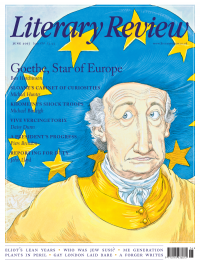Andrew Gallix
Read All About It
Barthes: A Biography
By Tiphaine Samoyault (Translated by Andrew Brown)
Polity Press 586pp £25
At first blush, the author of ‘The Death of the Author’ may seem a somewhat paradoxical choice of subject for a biographer. Au contraire, argues Tiphaine Samoyault in Barthes: A Biography, originally published in France in 2015. Just shy of five hundred pages long, excluding notes and index, it is, to date, the most comprehensive portrait of Barthes’s life and times. Calling it definitive – which in many respects it is – would be to miss the point, however. Memories being open to constant recomposition, Barthes felt that lives should not be written in stone. He hoped his own might be limited to a few ‘biographemes’ – ‘a few details, a few preferences, a few inflections’ – which, ‘like Epicurean atoms’, would perhaps touch ‘some future body, destined to the same dispersion’. The ideal biography would thus come in the form of a book in a box, like something by Marc Saporta or B S Johnson, the unbound pages of which could be shuffled around like the index cards Barthes wrote on. The stand-alone paragraphs of his own memoir, Roland Barthes by Roland Barthes (1975), were arranged in alphabetical order so as to obviate narrative continuity and its attendant teleological bias. While cleaving to a traditional, broadly chronological format, Samoyault goes to great lengths to ensure that Barthes does not end up pickled in aspic. In a prologue, she retraces his last steps on the day in 1980 when he was knocked over by a van, an accident that led to his demise (from pulmonary complications) one month later. ‘The Death of Barthes’ is, in effect, cordoned off, lest his life be reduced, retrospectively, to a fixed, univocal reading, akin to the ‘“message” of the Author-God’ he had once lambasted.
Barthes regarded death as the only event that truly eludes language. All the rest is discourse, as he argued in Mythologies (1957), a book in which he took reading out of the library and into the world. Rather than drawing up a laundry list of the different hats he wore,

Sign Up to our newsletter
Receive free articles, highlights from the archive, news, details of prizes, and much more.@Lit_Review
Follow Literary Review on Twitter
Twitter Feed
Though Jean-Michel Basquiat was a sensation in his lifetime, it was thirty years after his death that one of his pieces fetched a record price of $110.5 million.
Stephen Smith explores the artist's starry afterlife.
Stephen Smith - Paint Fast, Die Young
Stephen Smith: Paint Fast, Die Young - Jean-Michel Basquiat: The Making of an Icon by Doug Woodham
literaryreview.co.uk
15th-century news transmission was a slow business, reliant on horses and ships. As the centuries passed, though, mass newspapers and faster transport sped things up.
John Adamson examines how this evolution changed Europe.
John Adamson - Hold the Front Page
John Adamson: Hold the Front Page - The Great Exchange: Making the News in Early Modern Europe by Joad Raymond Wren
literaryreview.co.uk
"Every page of "Killing the Dead" bursts with fresh insights and deliciously gory details. And, like all the best vampires, it’ll come back to haunt you long after you think you’re done."
✍️My review of John Blair's new book for @Lit_Review
Alexander Lee - Dead Men Walking
Alexander Lee: Dead Men Walking - Killing the Dead: Vampire Epidemics from Mesopotamia to the New World by John Blair
literaryreview.co.uk